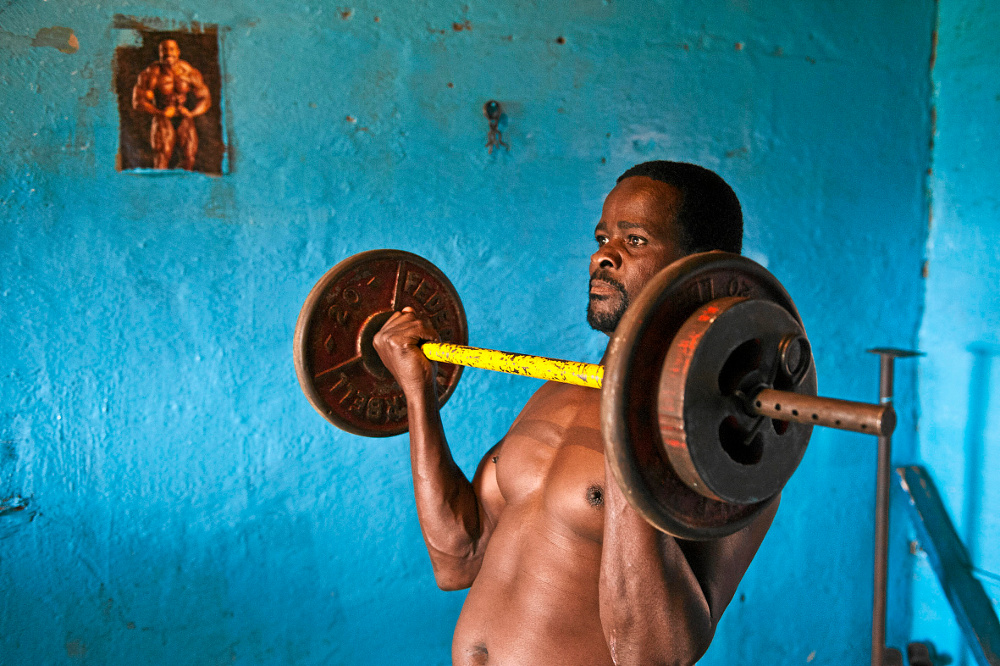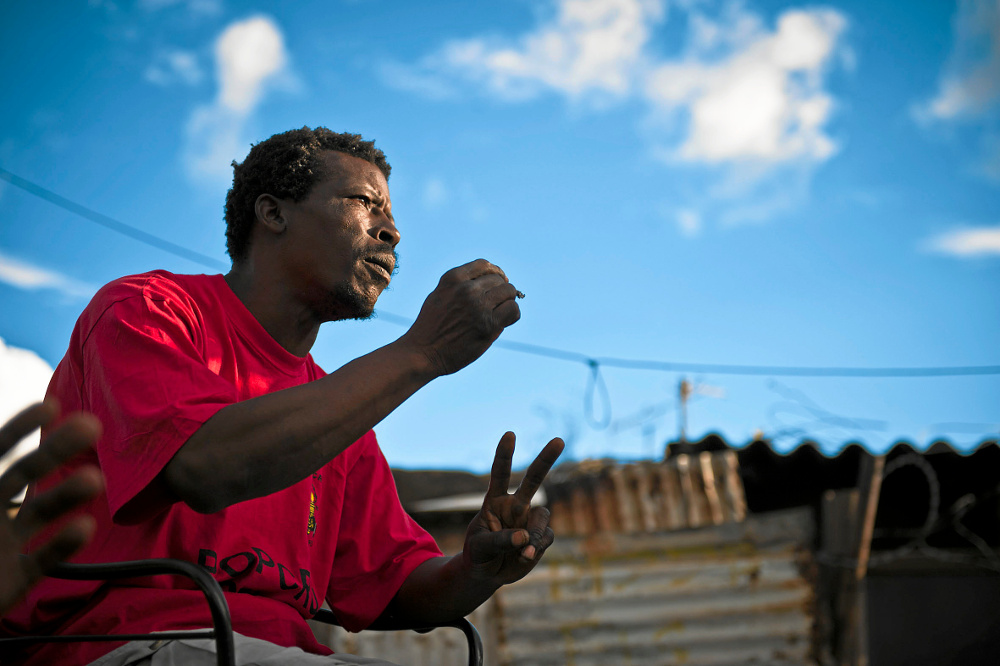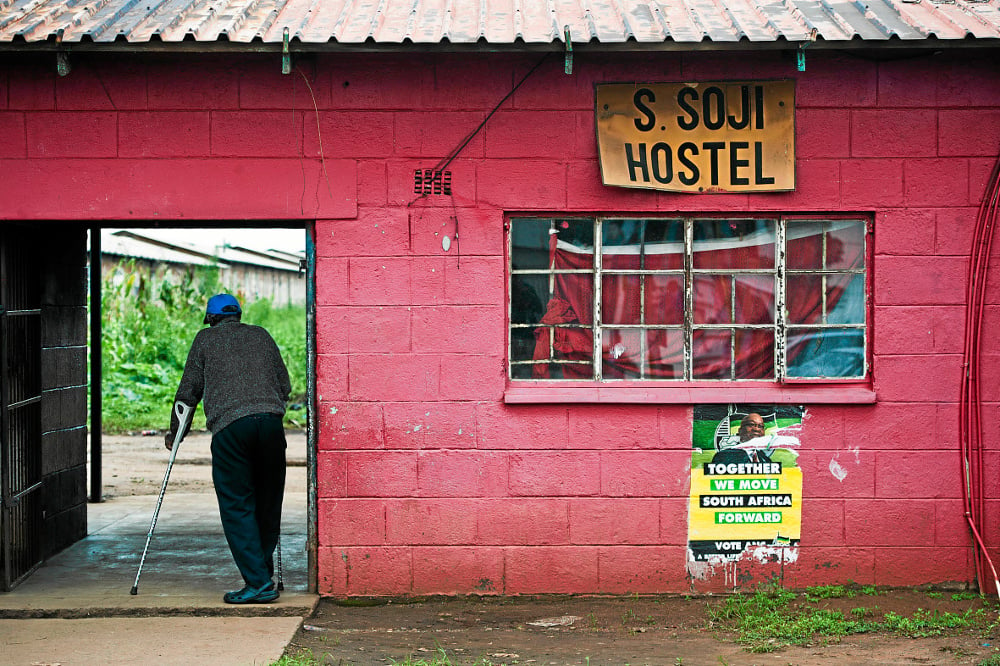Once a no-go area for long periods at a time
The Jacob Zuma posters plastered on the outer walls of the hostels lining Khumalo Street can be read in two ways. The first is as a signifier of normalcy and political tolerance in a township once marked by bloody battles for political ascendancy; the other as defiant nails in the coffin, signifying the political defeat and the lingering isolation of the hostel dwellers in the context of the greater township.
Away from the hostels, further into the township, the odd dilapidated house, a remnant from the displacement that was the by-product of the violence of the 1990s, hosts dice games being played by aimless teenagers who should be in school uniform.
Khumalo Street, the broad, winding thoroughfare that served as a border between hostels such as Madala, Khuthuza, Mshayazafe and the greater township, today bears the façade of normalcy. Residents, however, say the long-held tensions – kept in check by 20 years of democracy – bubble just beneath the surface, invisible to the untrained eye.
A 2009 report from the University of Johannesburg-based Centre for Sociological Research listed Thokoza as one of its four service delivery hot spots, alongside Piet Retief, Balfour and Diepsloot.
It noted that Mpilisweni informal settlement and some of the hostels, like Madala, continue to house people displaced by the 1990s political violence in which at least 3 000 lives were lost. Most were killed between 1991 and 1994. Some of the neglect in these pockets is seen as a political hangover from that period, as an ongoing punishment of the Inkatha supporters of the 1990s in an area that is now dominated by the ANC.

Leonard Zondi still recalls the wars, but today political parties can contest elections freely. (All photos by Delwyn Verasamy)
Near the Sam Ntuli Complex (formerly Thokoza Stadium) stands the Thokoza Memorial, a monument in the form of a sheltered plaque that bears the names of some of the victims – almost 700 of them – of the violence.
Scars
On a wintry autumn Friday, inside one of the three corrugated iron buildings that border its angular lawn, a pair of scruffy neighbourhood youths prepare a smoke of nyaope (a mixture of drugs).
In some of the crumbling hostels that dot Khumalo Street, men and women still professing to bear scars from the years of violence politely but firmly refuse the Mail & Guardian’s invitation to embark on a haunting trip down memory lane. Or they defer to the ndunas (headmen), who filter "intrusion" with a system of procrastination mixed with prohibitive and bureaucratic protocol.
The exception to this rule is Leonard Zondi, a short and lean gym enthusiast with pronounced pectoral muscles. "Although the violence built up over years, I remember 1994 as especially difficult," he says from a makeshift gym in one of the hostels. "One Tuesday, about two weeks before the elections, we were leaving for work. For some reason, some of the ndunas didn’t want to go to work, but I never questioned why.
"While at work – at Wits at the time – I heard on the radio news that Thokoza was burning up. I phoned a woman who was living on Khumalo Street. She said to me: ‘Son, I don’t know if you’re still going to find us when you come back.’
"I asked: ‘Ma, what is happening?’ At the time there were no cellphones, so I was calling her landline. In the background, I could hear the shots going off. I told my bosses I was leaving; I had to go back to Thokoza.
"The woman had said to me: ‘Whatever you do, don’t enter using Khumalo Street, use the access via the bridge.’
"When I got here, the place was awash with teargas and smoke. You couldn’t see anything. The hostel I was staying in, which hadn’t been physically attacked at that point, was then attacked. At block J, near my block, even the soil was on fire!"
'Better then'
Zondi, who frames much the conflict of those years around what he considers to be the hostel dwellers’ victories, says a major difference between those years and now is that police no longer conduct random searches at all hours of the night.
"What was better then," says Zondi, perched on the corner of a pressing bench, "was that there was more employment. The problem, though, was that the wages were nonexistent."
Former self-defence unit (SDU) members who have organised themselves under the banner of the Thokoza Vuka Foundation, which aims to advance development in the area, remember the details of yesteryear’s conflict with cinematic clarity. One Zulu Tshabalala – a hardy former commander in grey shorts and the red T-shirt of the Police and Prisons Civil Rights Union – recalls those bloody days. We are seated on a lawn adjacent to a busy storefront, the foundation’s headquarters.
He says the formation of the SDUs was precipitated by a low-level war on street committees affiliated to the South African National Civic Organisation (Sanco).

Zulu Tshabalala, a former SDU member, remembers aspects of the violence with cinematic detail, 20 years on. (Delwyn Verasamy, M&G)
In the rest of the country, pressure was mounting on the apartheid structures from the Free Mandela campaign, rent boycotts and stay-aways. "[In the 1980s] there were gangs like the Mampuru and the Mugabe," Tshabalala says.
"How we knew these were third-force agents was that these guys would kill someone and then announce it, like tell us: ‘We’ve killed him; now go and pick him up.’"
The brazenness of these killings – and the total impunity – convinced the comrades that the gangs were actually agents of the state.
Inkatha
At the same time, there were covert discussions between Inkatha and the apartheid government to neutralise Sanco and the street committees, according to Tshabalala.
"Around 1990 there was a rally called by uMntwana [Mangosuthu Buthelezi] in Thokoza Stadium, where he said: ‘We are here to work; those disturbing us with stayaways and rent boycotts when we want to pay rent must be dealt with.’
"The very next day, on a Monday, taxis were not passing by Khumalo Street. Those that did were being redirected into the hostels. People were being asked what an elbow or a baby finger is in isiZulu. If you couldn’t answer, you would be killed. That’s how we knew that the mood was changing."
Following that Inkatha rally, he says the soldiers set up camp in Thokoza. But it was soon clear that the soldiers’ job was to defend Inkatha, he says.
"By 1992 it was clear that it wasn’t a Zulu and Xhosa conflict; all of us [of all ethnic groups] were under threat." He recounts that in one incident dozens of people were killed in Phola Park, then an informal settlement near the Khalanyoni Hostel. "The SDUs were formalised through what Winnie Madikizela-[Mandela] said when she visited Phola Park following the attack: that we had to defend ourselves as the third force was in full swing. We started making oqhwasha [homemade guns], but some of the neighbourhood criminals also volunteered their guns. Money was also collected to ramp up the armaments."
Mchacho Mngomezulu, a tall, dreadlocked man in a beige ANC-branded golf shirt, says Thokoza was made more vulnerable by the shape of Khumalo Street, along which many of the hostels lay. The hostels formed an open pincer around most of Thokoza and some of the neighbouring Katlehong. The residents attacked the centre of the pincer by destroying and demolishing the Khalanyoni Hostel.
Meneer Mqubi, also a former SDU commander, says that following the 1994 elections there were sporadic attempts at healing the rifts caused by the violence. Fighters on both sides were supposed to be reintegrated into society.
But the regional arm of the demilitarisation programme, championed by former Ekurhuleni mayor Duma Nkosi (himself an ex-SDU commander), has subsequently suffered from "a lack of political will" among the region’s current municipal structures. Many of these veterans remain on the outskirts of society.
Youth
For the younger generation, too young to remember the violence explicitly, the burden of an empty dream is just as real. The youth make up 46% of Thokoza’s 106 000 people and almost half are unemployed.
"There’s a newly built shopping centre here – that’s some of the changes we are seeing – but the lifestyle, we’re still living in abject poverty, some of us," says soft-spoken Kgoshi Nkgadima, a wisp of a man.
Along with friends, Nkgadima organises networking sessions in Thokoza – trying to link entrepreneurs from other areas with local aspirant businesspeople. "Reconstruction or redevelopment as it has been happening in other places – we are not feeling it in Thokoza."
He has a sombre expression on his face. "We have a lot of, I would say, empty shells, you know. They are just people but they are dead spirits. The violence happened recently, so the legacy is still there. The issue of substance abuse is quite high in this area; maybe it’s because it is a mechanism that we are using to cope."
Indeed, even though Thokoza means rejoice in isiZulu, such a prospect remains remote for its residents.

An ANC election poster sits crudely on the wall of a hostel along Khumalo Street. (Delwyn Verasamy, M&G)